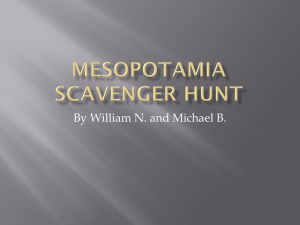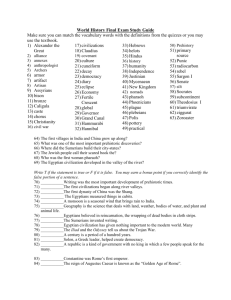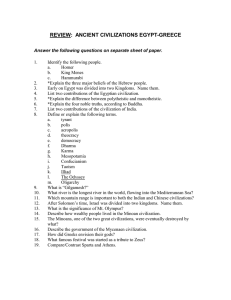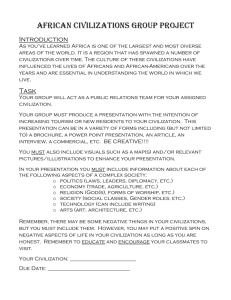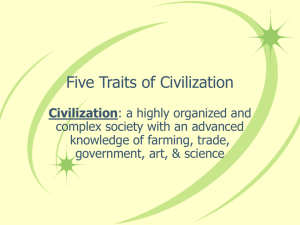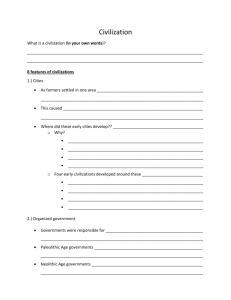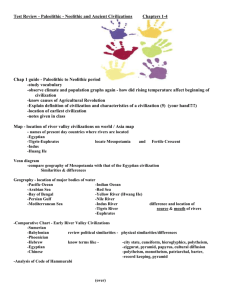I. II.
advertisement
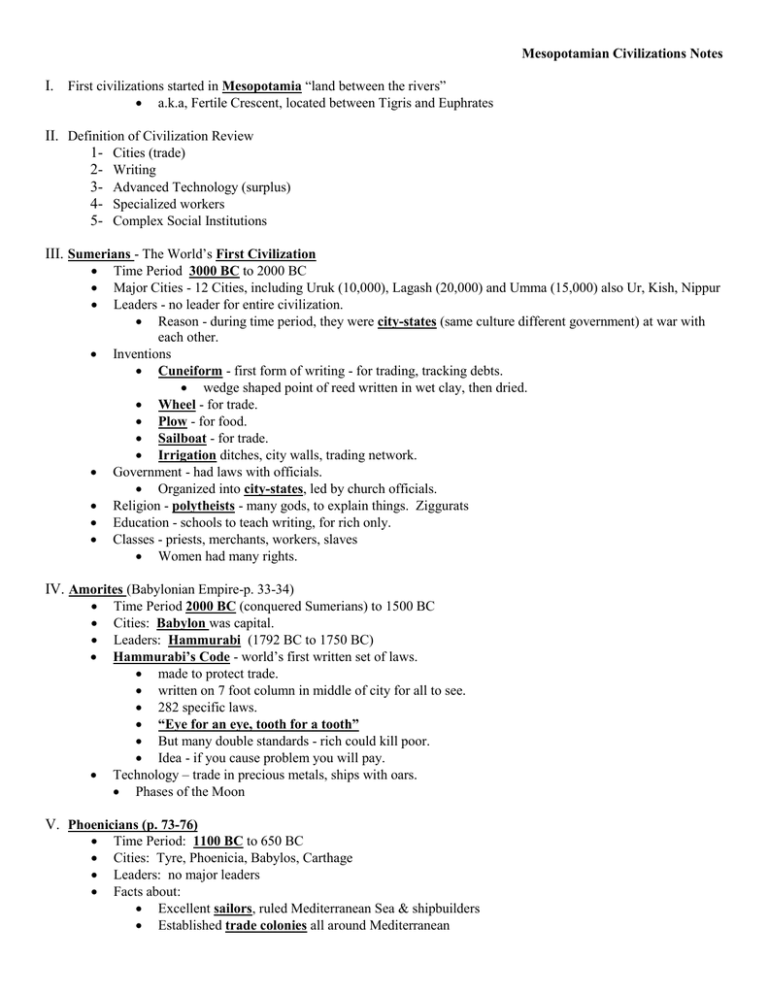
Mesopotamian Civilizations Notes I. First civilizations started in Mesopotamia “land between the rivers” a.k.a, Fertile Crescent, located between Tigris and Euphrates II. Definition of Civilization Review 1- Cities (trade) 2- Writing 3- Advanced Technology (surplus) 4- Specialized workers 5- Complex Social Institutions III. Sumerians - The World’s First Civilization Time Period 3000 BC to 2000 BC Major Cities - 12 Cities, including Uruk (10,000), Lagash (20,000) and Umma (15,000) also Ur, Kish, Nippur Leaders - no leader for entire civilization. Reason - during time period, they were city-states (same culture different government) at war with each other. Inventions Cuneiform - first form of writing - for trading, tracking debts. wedge shaped point of reed written in wet clay, then dried. Wheel - for trade. Plow - for food. Sailboat - for trade. Irrigation ditches, city walls, trading network. Government - had laws with officials. Organized into city-states, led by church officials. Religion - polytheists - many gods, to explain things. Ziggurats Education - schools to teach writing, for rich only. Classes - priests, merchants, workers, slaves Women had many rights. IV. Amorites (Babylonian Empire-p. 33-34) Time Period 2000 BC (conquered Sumerians) to 1500 BC Cities: Babylon was capital. Leaders: Hammurabi (1792 BC to 1750 BC) Hammurabi’s Code - world’s first written set of laws. made to protect trade. written on 7 foot column in middle of city for all to see. 282 specific laws. “Eye for an eye, tooth for a tooth” But many double standards - rich could kill poor. Idea - if you cause problem you will pay. Technology – trade in precious metals, ships with oars. Phases of the Moon V. Phoenicians (p. 73-76) Time Period: 1100 BC to 650 BC Cities: Tyre, Phoenicia, Babylos, Carthage Leaders: no major leaders Facts about: Excellent sailors, ruled Mediterranean Sea & shipbuilders Established trade colonies all around Mediterranean Very wealthy, much from purple snail dye (King’s color) Built colonies along African coast (30 miles apart-distance ship could travel in one day) First alphabet Blown glass VI. Assyrians (p. 95-97) Time Period: 650 BC to 612 BC (fell to Chaldeans) Cities: Ninevah Leaders: Assurbanipal Inventions: Disciplined army, conquered and killed many people. Ruled through fright. People scared of leaders. World’s first library - 25,000 clay tablets (p. 96) Story of the Assassins Ashur - Ashurism VII. Chaldeans (p. 97-98) Time Period: 600 BC to 550 BC Cities: Babylon - Hanging Gardens (one of 7 wonders of the world) Leaders: Nebuchadnezzar - rebuilt Babylon Babylon became huge trading city. Inventions: Zodiac, 4 phases of moon. Sundial. Captured Jerusalem in 586 BC, took Jews as slaves. One principal god “Marta” – beginnings of monotheism. VIII. Persians (99-103) Time Period: 550 BC Cities: Persepolis, Susa Leaders: Cyrus, Darius Facts about: conquered all from Nile River to Black Sea, to India Let Jews return to Jerusalem in 538 BC (parts of Bible first written) Darius built capital at Persepolis Advanced government - system of governors. Charged taxes. Had spies to ensure loyalty of his royal governors. Built Royal Road of brick 1700 miles long for trade. Metal coins “Eyes and ears” of the King – spies to control people. *Assignment -Pick any of the Mesopotamian civilizations after the Sumerians and create a 6 slide powerpoint presentation. -Slides 1-5 will be one slide each about the definitions of a civilization. Slide 1 will be listing, explaining and showing a picture of the advanced cities, slide 2 will describe the specialized workers, etc. through Slide 6. At the top of Slide 1 will be your name, the name of the civilization. -Slide 6 will be a primary source quote and your explanation on the importance and/or significance of the quote -For each slide include a picture that relates to the characteristic for that slide. -Use bullet points, statements and vocabulary words, not sentences or paragraphs -Use the notes, textbook and internet research to develop each slide -Print as handouts 6 per page -Due Monday, September 17

